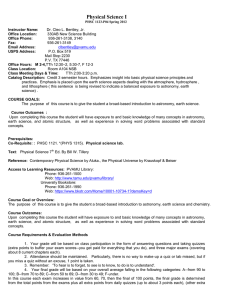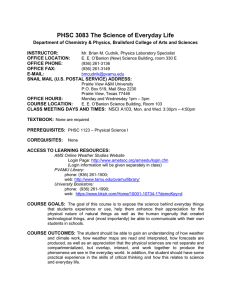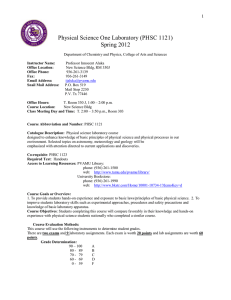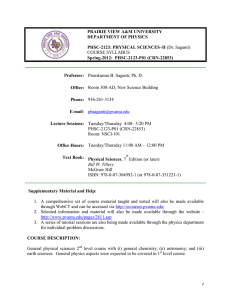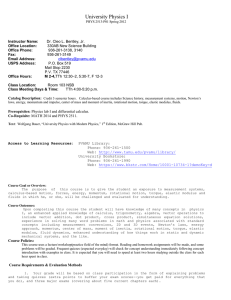Physical Science I
advertisement
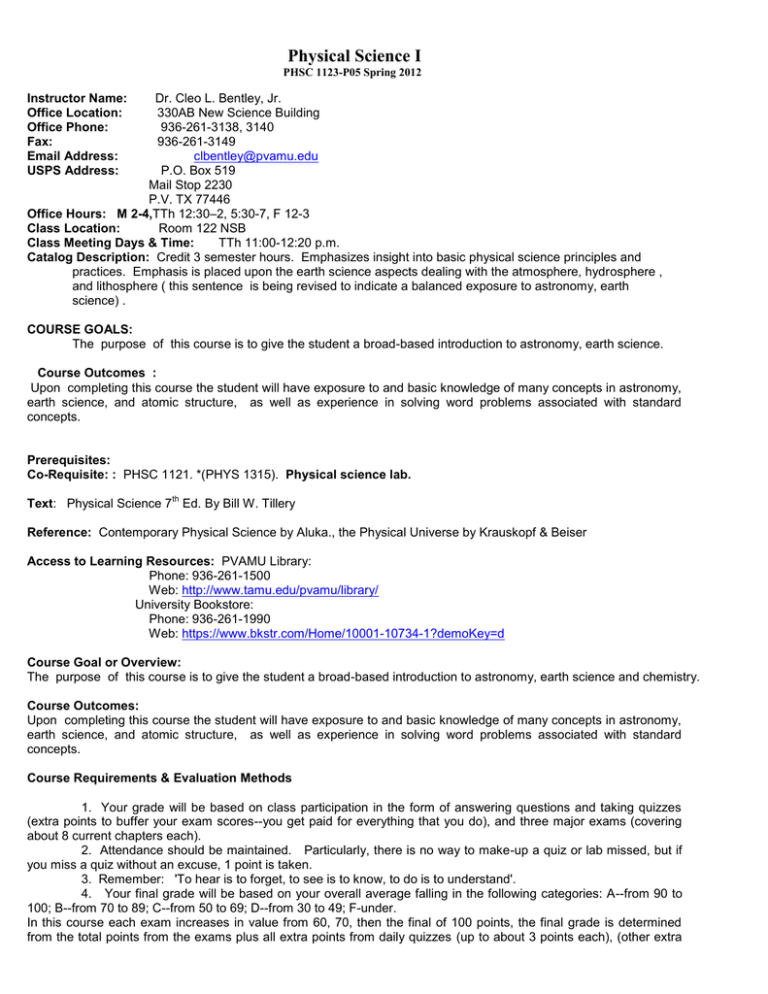
Physical Science I PHSC 1123-P05 Spring 2012 Instructor Name: Office Location: Office Phone: Fax: Email Address: USPS Address: Dr. Cleo L. Bentley, Jr. 330AB New Science Building 936-261-3138, 3140 936-261-3149 clbentley@pvamu.edu P.O. Box 519 Mail Stop 2230 P.V. TX 77446 Office Hours: M 2-4,TTh 12:30–2, 5:30-7, F 12-3 Class Location: Room 122 NSB Class Meeting Days & Time: TTh 11:00-12:20 p.m. Catalog Description: Credit 3 semester hours. Emphasizes insight into basic physical science principles and practices. Emphasis is placed upon the earth science aspects dealing with the atmosphere, hydrosphere , and lithosphere ( this sentence is being revised to indicate a balanced exposure to astronomy, earth science) . COURSE GOALS: The purpose of this course is to give the student a broad-based introduction to astronomy, earth science. Course Outcomes : Upon completing this course the student will have exposure to and basic knowledge of many concepts in astronomy, earth science, and atomic structure, as well as experience in solving word problems associated with standard concepts. Prerequisites: Co-Requisite: : PHSC 1121. *(PHYS 1315). Physical science lab. th Text: Physical Science 7 Ed. By Bill W. Tillery Reference: Contemporary Physical Science by Aluka., the Physical Universe by Krauskopf & Beiser Access to Learning Resources: PVAMU Library: Phone: 936-261-1500 Web: http://www.tamu.edu/pvamu/library/ University Bookstore: Phone: 936-261-1990 Web: https://www.bkstr.com/Home/10001-10734-1?demoKey=d Course Goal or Overview: The purpose of this course is to give the student a broad-based introduction to astronomy, earth science and chemistry. Course Outcomes: Upon completing this course the student will have exposure to and basic knowledge of many concepts in astronomy, earth science, and atomic structure, as well as experience in solving word problems associated with standard concepts. Course Requirements & Evaluation Methods 1. Your grade will be based on class participation in the form of answering questions and taking quizzes (extra points to buffer your exam scores--you get paid for everything that you do), and three major exams (covering about 8 current chapters each). 2. Attendance should be maintained. Particularly, there is no way to make-up a quiz or lab missed, but if you miss a quiz without an excuse, 1 point is taken. 3. Remember: 'To hear is to forget, to see is to know, to do is to understand'. 4. Your final grade will be based on your overall average falling in the following categories: A--from 90 to 100; B--from 70 to 89; C--from 50 to 69; D--from 30 to 49; F-under. In this course each exam increases in value from 60, 70, then the final of 100 points, the final grade is determined from the total points from the exams plus all extra points from daily quizzes (up to about 3 points each), (other extra points are competitive on the first-hand-recognized basis, so one must study and practice to build self confidence to produce correct answers before your classmates do) impromptu questions (1 point each), specific homework problems of .5 points each. 5, or more, negative points, however, are given for noisily disturbing another’s learning, cheating, disrupting, or the like. Maturity counts. Grades are then given on the following total point basis: 205—230 + 160—204 115—159 68—114 0—67 A B C D F Course Policies: This course uses the lecture format. Reading and homework assignments will be made, and some problems will be graded. Frequent quizzes (expected everyday) will check the student’s understanding of concepts explained beforehand in class. It is expected that the student will need to spend at least two hours studying outside the class for each hour spent in class. Be enthusiastic, relaxed, courteous and respectful of others wanting to learn, for example no extraneous conversations, no eating of food, no wearing of hats in class, nor the like. Course Content: Wee Topic k Introduction 1 COURSE CONTENT This course is the first of a two semester course in physical science. The objective 8 of the course is to enhance the students broad exposure to the physical sciences. It is desirable that the learning environment be a microcosm of the professional world--that is, the system of evaluation is to reflect the effort, as well as cleverness, that is produced by the student. Each student is "paid" extra points for class participation outside the three major exams. A list of what this course will cover and the tentative timetable is found below. Not e FIRST 9 WEEKS Chapters 1, 16, 17, 18--Science history, geocentric & heliocentric systems, Bodes law, Kepler's laws, measurement systems, the earth, latitude and longitude, time zones, First Exam, moon and telling time by moon phases, sidereal and synodic months, eclipses, tides, solar system, the Sun, stars, Hertzsprung-Russell diagram, cosmology, Review. Second exam. 9-16 SECOND 9 WEEKS Chapters 13-15 -- Meteorology, weather, geology, minerals, rocks earthquakes, plate tectonics, geologic time, pollution, geology and chemistry of the atom and periodic table, electron configuration, molecules, balancing reactions --chapters 7-8, organic chemistry groups, patterns and nomenclature, acids and bases, carbon dating, Review, Third (Final) exam. . 17 Review Final Exam University Rules and Procedures Disability statement (See Student Handbook): Students with disabilities, including learning disabilities, who wish to request accommodations in class should register with the Services for Students with Disabilities (SSD) early in the semester so that appropriate arrangements may be made. In accordance with federal laws, a student requesting special accommodations must provide documentation of their disability to the SSD coordinator. Academic misconduct (See Student Handbook): You are expected to practice academic honesty in every aspect of this course and all other courses. Make sure you are familiar with your Student Handbook, especially the section on academic misconduct. Students who engage in academic misconduct are subject to university disciplinary procedures. Forms of academic dishonesty: 1. Cheating: deception in which a student misrepresents that he/she has mastered information on an academic exercise that he/she has not mastered; giving or receiving aid unauthorized by the instructor on assignments or examinations. 2. Academic misconduct: tampering with grades or taking part in obtaining or distributing any part of a scheduled test. 3. Fabrication: use of invented information or falsified research. 4. Plagiarism: unacknowledged quotation and/or paraphrase of someone else’s words, ideas, or data as one’s own in work submitted for credit. Failure to identify information or essays from the Internet and submitting them as one’s own work also constitutes plagiarism. Nonacademic misconduct (See Student Handbook) The university respects the rights of instructors to teach and students to learn. Maintenance of these rights requires campus conditions that do not impede their exercise. Campus behavior that interferes with either (1) the instructor’s ability to conduct the class, (2) the inability of other students to profit from the instructional program, or (3) campus behavior that interferes with the rights of others will not be tolerated. An individual engaging in such disruptive behavior may be subject to disciplinary action. Such incidents will be adjudicated by the Dean of Students under nonacademic procedures. Sexual misconduct (See Student Handbook): Sexual harassment of students and employers at Prairie View A&M University is unacceptable and will not be tolerated. Any member of the university community violating this policy will be subject to disciplinary action. Attendance Policy: Prairie View A&M University requires regular class attendance. Excessive absences will result in lowered grades. Excessive absenteeism, whether excused or unexcused, may result in a student’s course grade being reduced or in assignment of a grade of ‘F’. Absences are accumulated beginning with the first day of class. Student Academic Appeals Process Authority and responsibility for assigning grades to students rests with the faculty. However, in those instances where students believe that miscommunication, errors, or unfairness of any kind may have adversely affected the instructors assessment of their academic performance, the student has a right to appeal by the procedure listed in the Undergraduate Catalog and by doing so within thirty days of receiving the grade or experiencing any other problematic academic event that prompted the complaint.
